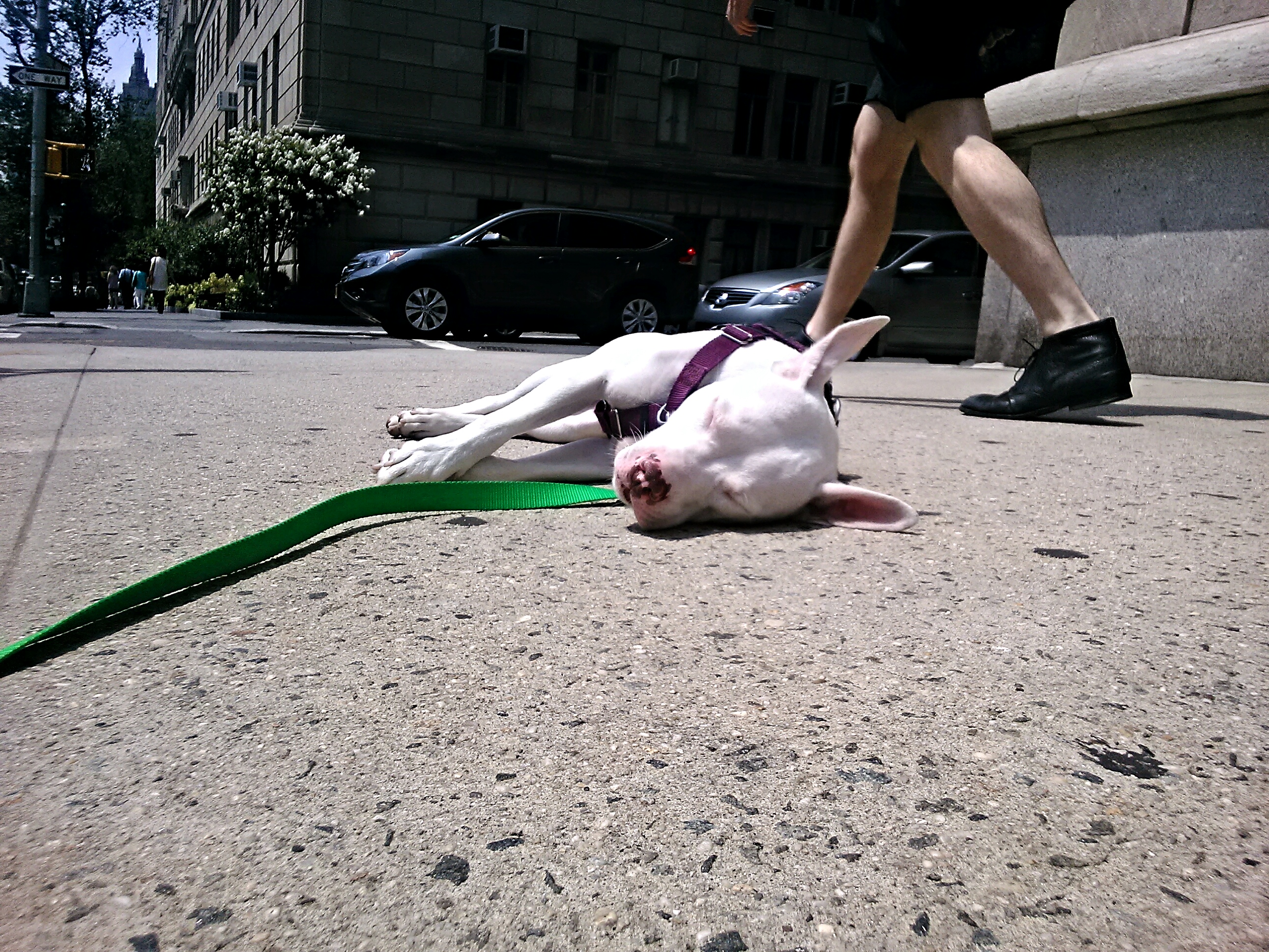
14 Apr Healthy Routine, Happy Dog
It’s too bad the IRS doesn’t let you claim your dog as a dependent, because that’s what she is. Her life revolves around you. And our lives can throw curve balls.
We can’t always fetch-and-return as quickly as we hope, or sometimes need. Stress at work, unforeseen accidents, finances–all of them disrupt your routine. And your dog’s.
Your dog reacts to when things become off. Dogs pick up on our unconscious body language. So, you come home late from a long week of work–you’re going to give off vibes of stress, fatigue, and you may cut your evening walk from an hour to a half-hour. At first, these things may seem like only little things. But remember, her schedule relies on yours.
Problem Behaviors
If stress enters the home, you may start to see how it’s affecting your dog. We’ve talked before about warning signs of stress and anxiety: but they really are an important indicator of how your dog is feeling.
Remember signs differ: Check out our post on reading body language!
Dogs who are stressed may ask for attention by chewing household items, tugging on the leash, reacting to dogs on the street, or barking. Their appetite could noticeably change, or she may begin protecting her food. She may have unusual bathroom accidents in her space, start getting anxious when you leave, or seem to struggle with things she’s not had trouble with in the past. In short, if your pup’s behavior becomes atypical for her, she may be a bit too stressed.
Sometimes, this is because she is having trouble predicting what is going to happen. Her daily life has become uncertain! That means it’s time to…
Make a Schedule
And keep it. Understandably, your routine is sometimes a little uncertain when you’re stressed. So, for the sake of both your health, construct a daily routine that allows wiggle room. This will help prepare your pup for days when you really need her to be a little flexible.
Time slots are a good way to start. Give your dog an hour or so window to expect certain activities. Sure, a dog can’t measure time by looking at a watch, but patterns and expectations tell them that time is passing. It may sound odd, but try feeding your dog (for example) at different times within a time slot. Don’t allow yourself to be too early or too late, but by being flexible in a set perimeter, you’re not building expectations of a rigged schedule.
Enlist help on days you know it will be difficult for you to keep to your pup’s schedule. Even flexible schedules can only stretch so far. If you don’t already have a walker, or if you don’t use a NYC dog walking service very often, research options in your neighborhood and set up a relationship with a company so you always have a backup. If it fits in your budget, it may make sense to make a walker a part of your pup’s daily or weekly schedule. A good company will work with you to get both you and your pup through overly busy times.
[mk_padding_divider size=”40″][mk_circle_image src=”https://www.puptopianyc.com/wp-content/uploads/2013/09/IMG_8066.jpg” image_diameter=”500″]
[mk_image src=”https://www.puptopianyc.com/wp-content/uploads/2013/09/nyc-dog-sitting-service.jpg” image_width=”800″ image_height=”350″ crop=”false” lightbox=”false” frame_style=”simple” target=”_self” caption_location=”inside-image” align=”left” margin_bottom=”10″]
Introduce Relaxation
Relaxation is an essential part of every dog’s schedule. Dogs need down time just like we do. Obviously, noisy, rambunctious, or stressful environments are difficult to relax in, so take a moment and think about your pup’s daily activities. Does he have the opportunity to relax and sleep soundly? Keep in mind that being home alone may not be all that restful for pups who suffer from separation anxiety. A pup who becomes anxious in your absence may be a candidate for a well run doggie daycare where he’ll have the opportunity to rest in the presence of other people.
Also keep in mind that doggie daycare may not be a good idea for a pup who just can’t say no to play. Many pups spend their days overstimulated and could benefit from staying home on occasion, perhaps with a walker to give them some love and exercise midday.
Last, but by no means least, think about your home environment. Does your pup have his own space where he can retreat to and rest unbothered? Think about that location – is it actually a relaxing place, or is it right next to a busy walkway or door? Also think about the general environment – is there an air freshener right next to your pups bed? Remember that dogs have exponentially better smell than we do, and a strong scent might be secretly driving her nuts! Is her bed to her liking – soft enough / firm enough / easy to get in or out of? How about noise? Is it quiet, or right next to a tv that’s usually on?
Keep Her Focused
Set aside short training sessions to keep your pup’s mind active. Even daily, 2 minute sessions of basic cueing can help relax your dog. Dogs get bored, and restless too! Yes, taking her on a walk for exercise will work those muscles, but we all need to flex our brain.
Set a goal and have some fun with those 2 minutes – is there a trick you’d like your pup to know? Or maybe you just want to strengthen a cue she already knows. You don’t have to teach the entire trick in a day, but rather work on a little bit at a time. For example, if you’d like your pup to roll over, start by rewarding her for lying down the first couple of sessions. Then up the ante a little, and reward for her lying down and shifting to her side the next session. Slowly increase what you expect her to do until you’ve arrived at a full roll over.
Keep it upbeat, fun, and full of rewards – pups learn better and relax more readily when you’re telling them about all the things they’re doing right!
A Good Night’s Rest
Nothing cures stress like the relaxing restfulness of sleep. For both you and your dog, a good night’s rest could mean the world when getting back in the groove of your schedule. Sleep not only releases good hormones, but it also resets you by supporting focus, rejuvenation, and releasing pent up stress. Use relaxation methods for your dog to help her sleep well at night. These can include lots of exercise during the day, creating a personal and distraction-free sleeping space, massage, or chew toys like Kongs. Making sure you and your pup are getting the sleep you need. Even if your schedules are askew, will make a big difference when it comes to health!
If you start finding your daily schedule is affecting your dog’s. It’s okay! What you both need to do to focus, relax, and make a plan. Even when you’re both operating on an unusual schedule, preparing in advance with things like time-slots, relaxed environments, and doggy day care or walkers can make a big difference. Relaxation and flexibility can mean a lot for both of you! Creating a healthy routine can release tension, even on the worst of days.




No Comments